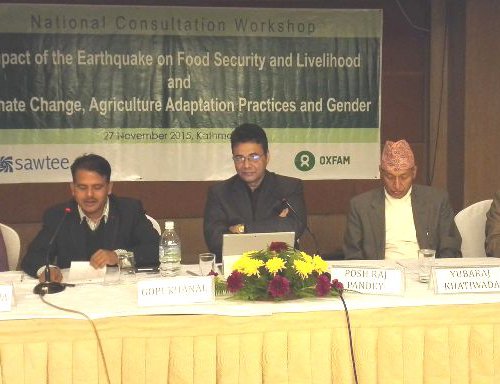
SAWTEE along with International Development Research Centre (IDRC) Canada is organizing a two day regional consultation titled “South Asian Consultation on Green Economy”. The main objectives of the consultation are to come up with major research agenda create a network of like-minded institutions to help South Asia make transition towards a green economy.
The consultation began with SAWTEE’s Chief Executive Director, Dr Ratnakar Adhikari stressing the need for a green economy in the region due to its high level of poverty and high vulnerability to climate change. Arjan De Haan, Program Leader for IDRC’s Supporting Inclusive Growth, Social and Economic Policy Unit, raised an important question of how do we minimize the tradeoffs between economic growth and environmental conservation? He stated the need for the consultation to come up with policy prescriptions to balance these tradeoffs.
Talking about green economy in the context of Nepal, Chief Guest Yuba Raj Bhusal, Secretary of the National Planning Commission stated the NPC’s aim of Nepal’s gradation from a Least Developing Country (LDC) to a Developed Country by 2022. He further stressed the need to understand how a green economy can aid in this transition process. Secretary Bhushal stated the need for Nepal to study the potential of Small and Medium Enterprises, hydropower and ecotourism and incorporate these issues in the next three year plan. He ended his speech on how to achieve a green economy securing a balance between development and conservation was a must.
The keynote address by Dr Arbinda Mishra of The Energy Resources Institute (TERI), New Delhi focused on coming up with a operation definition of green economy for South Asia. He talked about how understanding the concept of green economy in a pluralistic sense is necessary and we should talk about “green economies” rather than a single “green economy”. He stated three major challenges to sustainable development in South Asia: promoting social inclusiveness, managing urban transition and building resilience. According to Dr Mishra, the way forward for South Asia is to develop international and regional cooperation, policy innovations (risks, flood insurance, etc), and promote inclusiveness.
Adding to the previous speakers, chair of the session, Dr Adhikari identified other challenges like identifying the sectors which could potentially contribute to a green growth agenda, designing policies, regulations and incentive structure at the domestic level, overcoming trade barriers in the international market, and accessing financial, technological and human resource to make the necessary transition towards green economy. He also stated that mobilizing domestic resources as well as expertise is necessary to address some of the above mentioned challenges.
The participants expressed the view that South Asia is the least contributor to climate change but is one of the most affected and that there is a need for the region to find a way out and hoped that the consultation will show us the way out.
More than 40 participants from Bangladesh, Bhutan, Canada, India, Korea, the Maldives, Nepal, Pakistan and Sri Lanka are participating at the two-day event.
- TANAHU HYDROPOWER PROEJCT: A Significant Achievement
- Apr 15, 2024
- AMBASSADOR HANAN GODAR: Sharing Pain With A Nepali Family
- Mar 30, 2024
- VISIT OF KfW AND EIB TO NEPAL : Mission Matters
- Mar 25, 2024
- NEPAL BRITAIN SOCIETY: Pratima Pande's Leadership
- Mar 24, 2024
- NEPAL ARMY DAY: Time To Recall Glory
- Mar 15, 2024
















